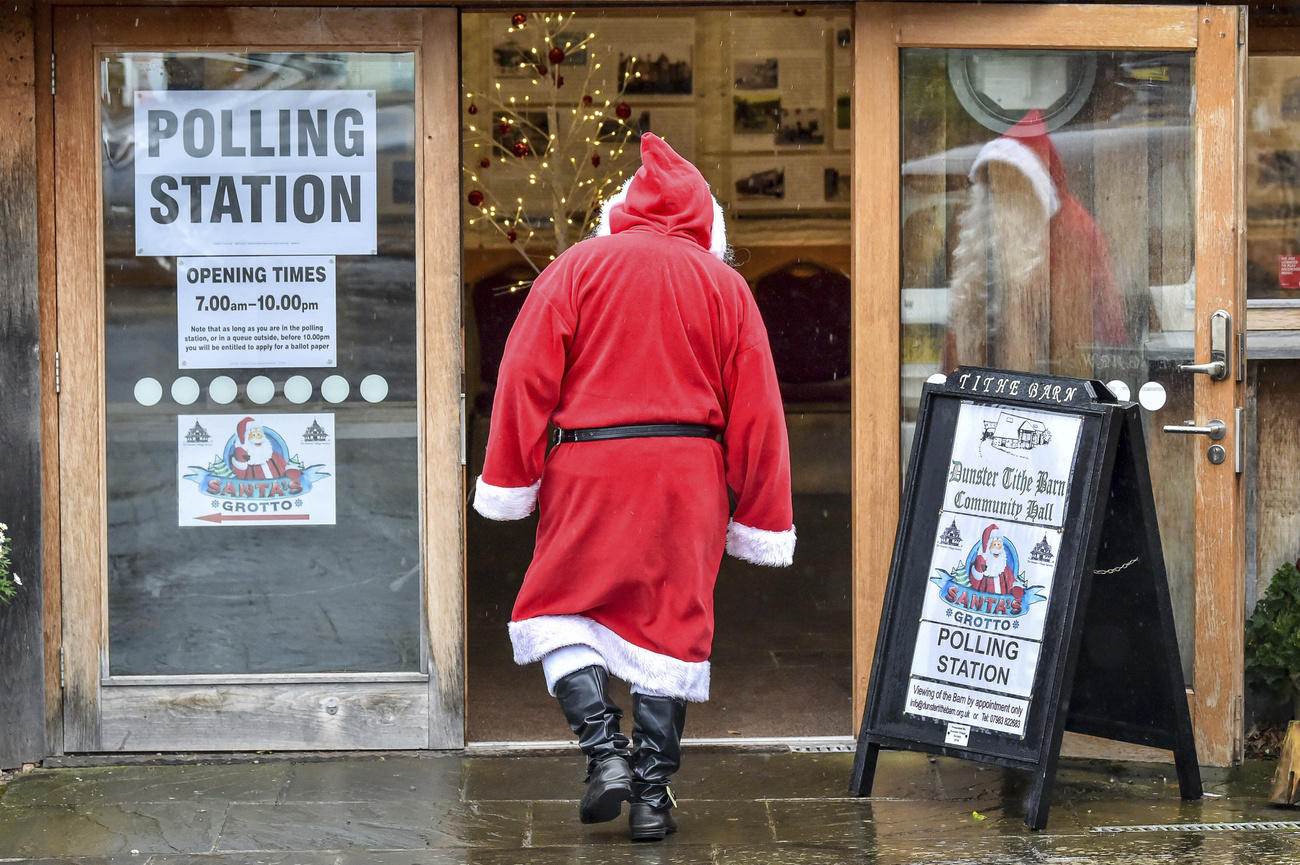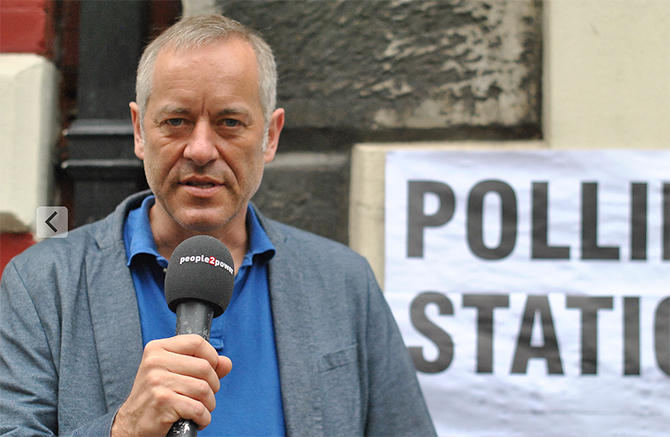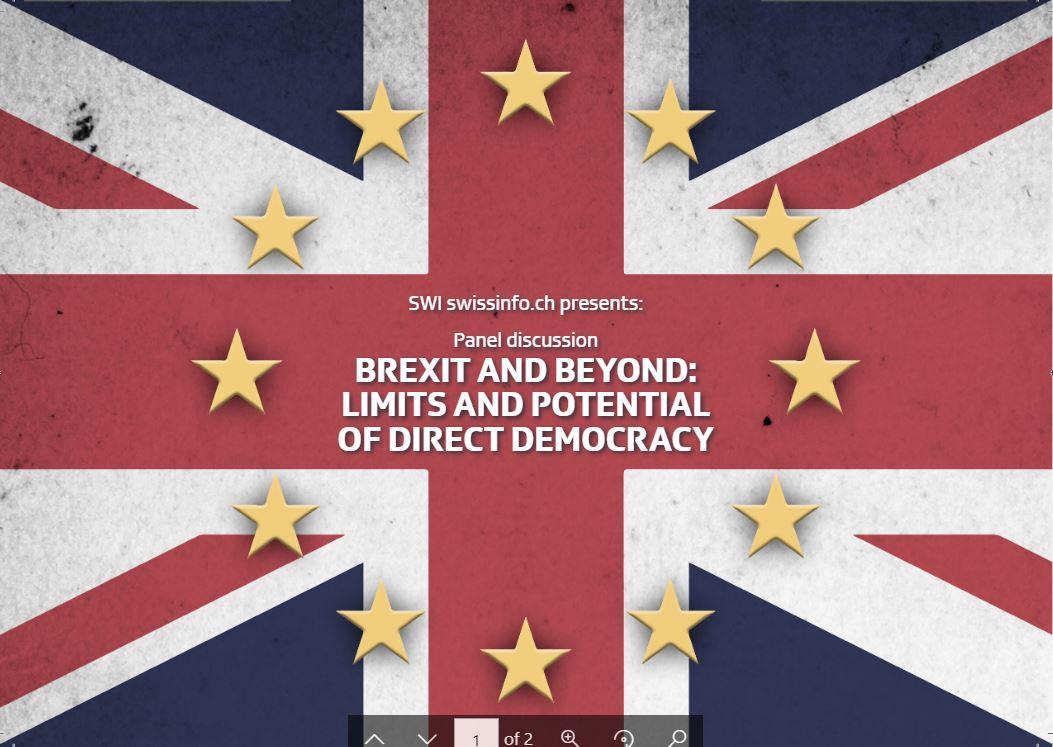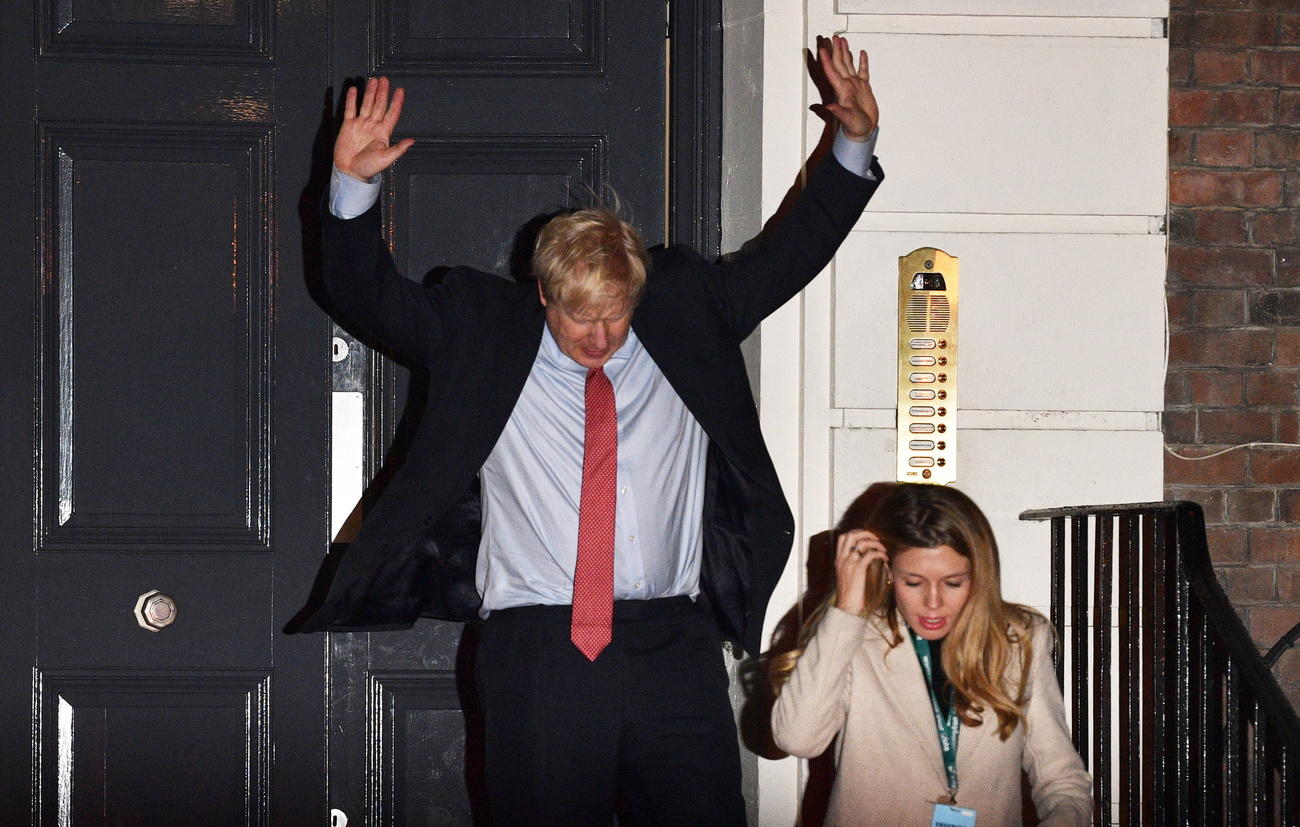UK election: ‘A goal in extra time is not a good way to do politics’

What does the latest election result in Britain mean for the state of the country’s democracy?
Political analysts Patrick Emmenegger and Bruno Kaufmann have observed numerous referendums in Switzerland and abroad. They weigh in on next steps for Britain and the British political system following Thursday’s general election, which many have labelled another referendum on Britain’s exit from the European Union.
swissinfo.ch: Where does the planned EU exit leave the large number of people who voted Remain and who campaigned for a second referendum? Where will they voice their democratic concerns in future?

Patrick Emmenegger: The result is clear. The large number of people who would like to remain in the European Union can express their dissatisfaction from the opposition seats in Westminster or in the media. Yet, the Conservative majority will move on with Brexit. However, Brexit won’t be over in January. Numerous questions about Britain’s future relationship with the European Union will have to be settled. The topic won’t disappear. At the next election, voters will be given the opportunity to hold the government accountable. But until then, the Johnson cabinet will move forward. This is the way the British system works, for better or worse.
Bruno Kaufmann: The winner takes all; that has been the strategy by Brexiteers ever since the surprising victory in the 2016 popular vote on the EU. This time, in the election, the pro-Brexit parties did get far less than 50% of the vote and yet, as the UK election system delivers an absolute majority of seats to the biggest party, proponents of another confirmatory vote have simply lost. With Boris Johnson as prime minister, there is little outlook for reconciliation or reform in the next five years.
swissinfo.ch: Should the Conservatives now offer a second referendum on Johnson’s exit agreement as a fig leaf to the 50% of the country that has been largely alienated?

P.E.: From the point of view of legitimacy and overcoming divisions, it might be good to have a second referendum. Yet it’s likely that the second referendum will be just as divisive as the first one. What’s more, Johnson has turned the election into a vote about Brexit. While only a minority voted for parties favouring Brexit, the small majority not doing so was unable to rally behind a clear Remain platform. Put differently, the election did not reveal a majority against Brexit, either. Hence, given the result, the Conservatives will interpret this as a plebiscite in favour of Brexit. Finally, Johnson would run major risks by allowing a second referendum. He might narrowly lose it, and he would certainly alienate those who supported him because he promised to move on with Brexit. There is little reason for him to pursue this strategy now.
B.K.: A confirmatory vote should have been the most natural next step after reaching an agreement with the EU. But now, after calling the general election a plebiscite on Brexit, the victorious Conservative party will certainly not go that way. In the British tradition there is nothing like a “happy loser” or “humble winner”. Bad luck for most UK voters, who now will be unrepresented in government for a long time. As in the United States, the country will now been run by a political leader and party which do not represent most UK citizens. In Scotland, where the Scottish National Party took all but a few seats, the crisis could become dramatic after all, as Boris Johnson has said he is unwilling to let Scotland have a second independence referendum.

More
Watch: Brexit and direct democracy discussion
swissinfo.ch: Has this election, despite its divisiveness, shown any bright signs for more democratic participation in Britain in the future? How can the uptick in political/grassroots engagement be best harnessed institutionally?
P.E.: The campaigns have mobilised new voters, but they have also alienated others. Part of the weak Labour result is probably due to traditional Labour voters staying at home. From the point of view of democratic participation, the goal must be to keep the new voters involved and get the others to participate again.
B.K.: The United Kingdom has in recent years indeed seen a sharp increase of political participation by citizens, including high turnout rates in the EU vote as well as the two subsequent general elections. But most genuine activities have been registered on the local level. This is positive also with respect to the 2020 citywide elections, including the vote for London mayor next spring. Britain’s democracy is under pressure but very much alive.
swissinfo.ch: What does the turnout rate of 67.2% mean for the legitimacy of the outcome?
P.E.: The turnout rate has declined by roughly 1.5 percentage points over the previous election. Given the time of the election, two weeks before Christmas, this is a success from the point of view of democratic participation. However, the turnout rate also shows that the opponents of Brexit have failed to mobilise the masses against the Conservative government.
B.K.: With more than two-thirds of eligible voters participating in this “Brexmas” election, the Brits have shown a strong resilience towards arguments that their democracy is broken. While this increases the legitimacy of the vote, the fact that only a minority of voters opted to support Brexit-leaning parties and still got the overall majority does not.
swissinfo.ch: Former UK Prime Minister David Cameron’s decision to launch a plebiscite in 2016 was largely motivated by party politics. The result of that decision, Brexit, is still largely a slave to party politics. What concrete steps could change this situation?
P.E.: The Brexit debate and the election were very divisive. Some cross-partisan collaboration in the process of regulating and developing the future relationship with the European Union would certainly be advisable. This would necessitate some change of strategy on behalf of Boris Johnson, but it would probably also need a new Labour leader. Now that the Brexit question is settled, the parties should engage in bridge building and developing a relationship with the European Union that a large majority in Britain can support.
B.K.: The United Kingdom needs an agenda for democracy at all levels. The country is deeply split along national, economic and political lines. New divisive votes, including a second referendum on independence in Scotland, are possible. The same may be true for Northern Ireland, which will feel excluded from the UK by Boris Johnson’s EU agreement. The problem now is that the Brexit issue will not cool down for a while, as most agreements between the UK and the EU will have to be renegotiated – in a complicated and lengthy process.
swissinfo.ch: As with the Brexit vote in 2016, is it healthy for a country to hang so much importance on the outcome of a single vote? Or is this brinksmanship a good way to spur politicians and the public to make a choice?
P.E.: No, I do not think this is healthy. Especially if this single vote is interpreted with a “winner takes all” mentality. The Brexit vote showed a divided country. British politicians would have been better advised to develop strategies to deal with the European Union that are supported by a large majority of the population. Championships in football can be decided by a goal in extra-time. However, this is not a good way to do politics.
B.K.: I am not sure at all that this dramatic but limited form of citizens’ participation is very healthy – for anybody. The only way forward is therefore to use the space given after yet another election to deepen the conversation within Britain and beyond.
Comments were submitted in writing

More
UK election: ‘The hard work is only just beginning’

In compliance with the JTI standards
More: SWI swissinfo.ch certified by the Journalism Trust Initiative



You can find an overview of ongoing debates with our journalists here. Please join us!
If you want to start a conversation about a topic raised in this article or want to report factual errors, email us at english@swissinfo.ch.